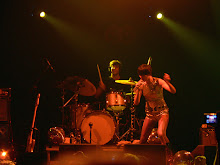So this is an absurd exercise, but why? Because it’s too short, of course, but also because we don’t really know what we’re asking. When I canvassed votes for an album of the decade among friends, several (who shall remain nameless) pointed out that Britney Spears could be in the running by some measures…
So let me try and clarify my terms, so that the task is a bit more reasonable. I wonder if I can get away with: “I’d like to write about the albums that, by my own warped standards, I felt presented the best creative work of the decade?” Clearly that’s not enough. Slipping and sliding around, balanced precariously on top of a mountain of a hundred thousand albums from the last ten years, I need to find some qualitative measure that will help me to find my way back down onto solid ground.
And now I come to reflect on it, it does seem that there are two aspects of music that I respect, and respond to, more than all others.
The first is intimacy. However cheesy it may sound, I want an album to feel first and foremost like it binds me very, very closely to the emotional state of the musician who records it. When I look at it this way, my choice for album of the decade is pretty clear.
PJ Harvey has a mass of great work behind her, but 2007’s “White Chalk” is such a simple, elegant, moving album that it burrows deep beneath your skin and doesn’t let go.

Played largely on upright piano, with minimal studio bell and whistles, “White Chalk” is the kind of album that sounds like it came from a different time, but when you try to work out when exactly, you are left scratching your head. It’s not like any other album of that year at least. The narratives which Harvey writes in these songs are very much her own, but once you have listened to this album, carefully and without distraction, you will think each of them yours and yours alone.
The second thing I want out of any great album is euphoria. A great album manages to sound vast and overwhelming and like it will whisk you away from… well, from your own small life. You enter into the world of a soundtrack from a fantastic, epic movie that was never made. [Yes, I can see these two demands of great music are hardly comparable!] My runner-up then, for album of the decade… The biggest, most beautiful, and most incredibly well constructed album I’ve heard in the last ten years is
Elbow’s “Cast of Thousands” (2003).

Years before Elbow’s explosion into one of the biggest bands in Britain over the course of 2009, it seems they decided to write an album as grand – almost as operatic – as if they already saw the crown within their grasp. Tenth track ‘Grace under pressure’ ends with the sound of their audience at the Glastonbury festival singing with them, and listening to it makes me feel like Elbow is not a band, but an army. They are (as they themselves tell us) thousands strong, each able to express, for a moment, their joy at the world. There is nothing more I could ask from them than that.
These then, stand as my votes. I feel sure they are not yours. I hope I’ve at least made my rationale for these choices a little clearer. Please protest. Stake your claim, and do it for reasons that are all your own.





 I could see in them a connection to a new drive to put the intelligence back into British indie music, along with other excellent bands like
I could see in them a connection to a new drive to put the intelligence back into British indie music, along with other excellent bands like 












.jpg)







